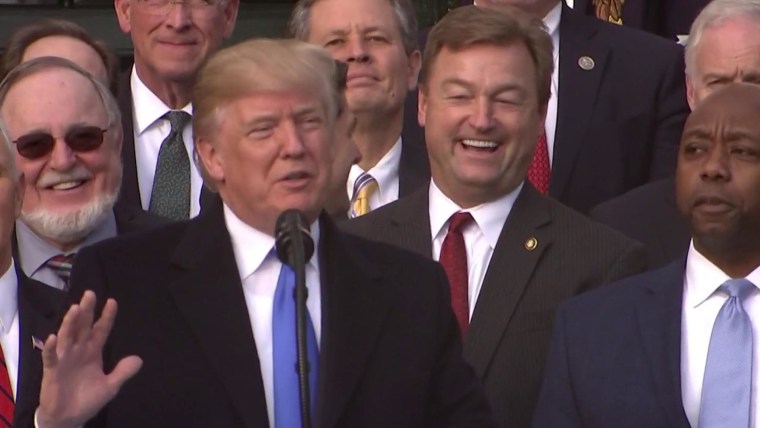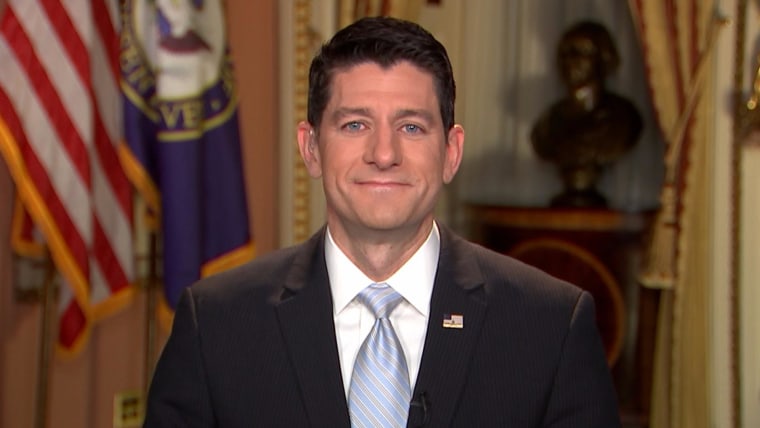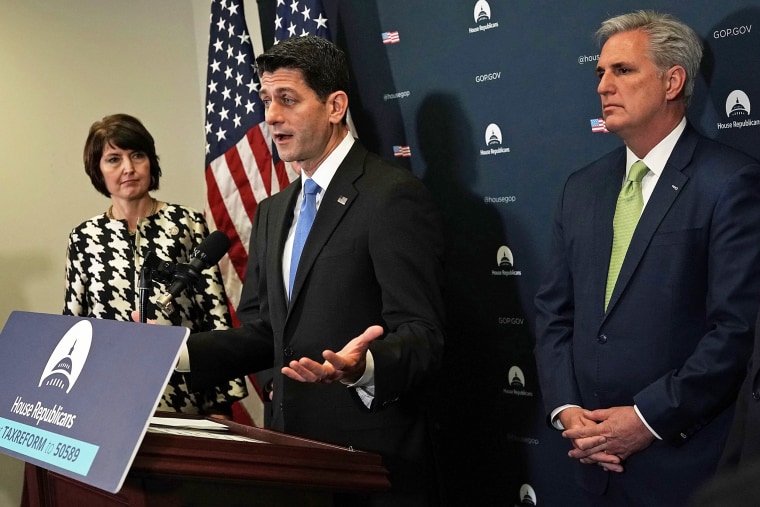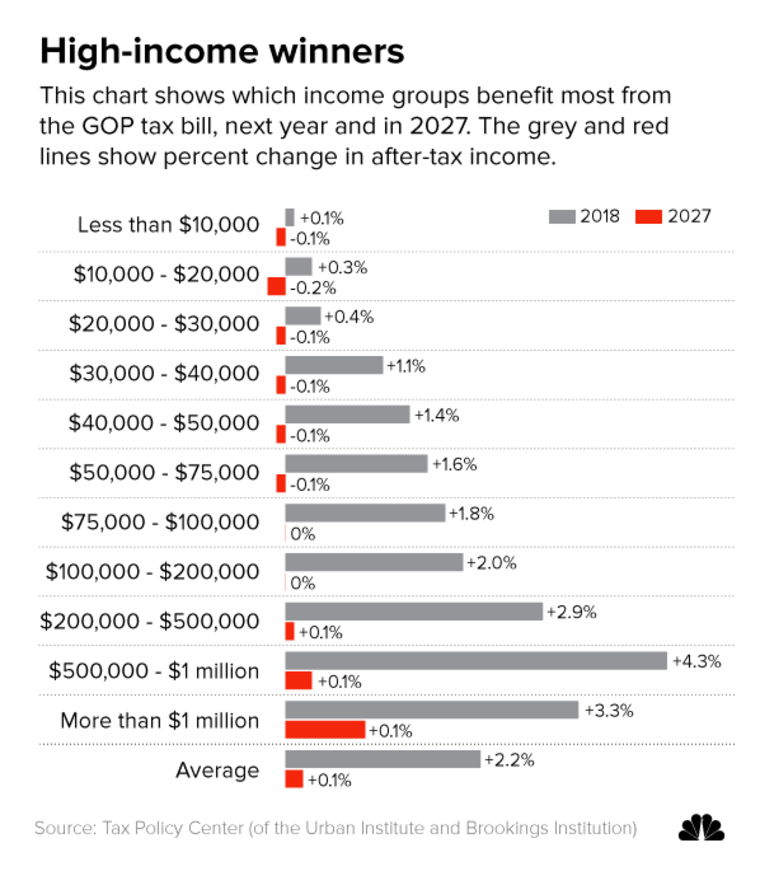How Many Lawmkers Read the Tax Bill
WASHINGTON — Congress approved a sweeping $1.5 trillion tax bill on Midweek that slashes rates for corporations, provides new breaks for private businesses and reorganizes the private revenue enhancement code.
The Senate passed the GOP bill early Wednesday morning and the Business firm then voted on it for a second time to set technical problems with the legislation, the concluding step before information technology's sent to President Donald Trump for his signature. No Democrats in either the House or Senate backed the measure out.
It is the president's first significant legislative accomplishment and the biggest tax overhaul in a generation.
Trump, who praised the Republican bill as a "celebrated victory for the American people" at a Cabinet meeting Wednesday, is holding an event at the White Business firm in the afternoon with GOP members of the House and Senate to celebrate passage, White House Press Secretary Sarah Huckabee Sanders said. The president is expected to sign the bill at a later engagement.
Trump tweeted Wednesday that the revenue enhancement cuts are "so large and and so meaningful," adding: "This is a example where the results will speak for themselves, starting very soon. Jobs, Jobs, Jobs!"

The Republican bill was initially approved on a 227-203 vote in the Firm Tuesday, with no Democrats supporting it. Twelve Republicans likewise voted against the measure.
With Vice President Mike Pence presiding and Treasury Secretary Steve Mnuchin on hand, the Senate then voted 51-48 in favor of the nib. Again, with no Autonomous support.
"Later eight straight years of irksome growth and underperformance, America is ready to have off," Senate Bulk Leader Mitch McConnell said following the vote.
The bill, the product of negotiations between Republicans in the House and Senate, achieves longtime Republican goals, including a permanent reduction in the corporate revenue enhancement rate to 21 percent from 35 percent that supporters argue will brand American business organisation more than competitive overseas.
Many pass-through businesses also receive a more complicated 20 percent deduction, which became a subject field of vehement fence later on the final bill added a provision probable to do good real estate companies similar Trump'due south.
House Speaker Paul Ryan, R-Wis., lauded the bill during an interview with NBC's "Today" on Wednesday morning, reiterating the GOP'southward claim that cut the corporate revenue enhancement rate would let American companies to create new jobs with the savings and rejecting criticism that companies would merely pocket the savings.
"It's not a question of if, information technology's a question of how much they do good," he said.
The neb will "put the American economy in a better position," Ryan said, because "workers do good, wages go up."
"This is a big tax cutting for families equally well," he said.

A day earlier, speaking on the House floor moments before the vote, Ryan said the legislation volition "help hard-working Americans who have been left backside for too long."
"Today, we are giving the people their coin back," he said, calculation that a typical family would get a $ii,059 tax cut adjacent yr.
Democrats opposed bill equally a benefaction to the wealthy while offering little for the middle class, with House Minority Leader Nancy Pelosi, D-Calif., calling it "the worst bill to always come to the floor of the Firm."
There were a number of protesters in Congress on Tuesday, on both the House and Senate sides. Protesters interrupted the Senate's final late dark vote numerous times, at one point shouting, "Impale the bill. Don't kill u.s.a.." Ane protester interrupted Ryan in the House when he was speaking.
The GOP bill lowers private taxation rates, including the peak bracket to 37 per centum from 39.6, while doubling the standard deduction and replacing personal exemptions with a $2,000 partly refundable child revenue enhancement credit. Information technology eliminates various deductions while limiting others on state and local taxes and mortgage interest. It as well exempts larger inheritances from the estate tax, doubling the thresholds to $xi one thousand thousand for individuals and $22 million for married couples.
The bill as well has meaning implications for health care, where information technology abolishes the Affordable Care Act'southward penalty for Americans who don't buy insurance. The Congressional Budget Office estimates that change would lead xiii million more Americans to go without coverage after a decade and cause premiums on the individual market to rise 10 percent per twelvemonth.
On Tuesday, Sanders also defended claims by the president — which tax experts say are likely wrong — that his ain taxes would go upwards nether the legislation, saying the bill "certainly, on the personal side, could toll the president a lot of money."
While Trump has bucked tradition by refusing to release his tax returns, he is probable to benefit from cuts to the top income tax rate and especially from a new 20 percent deduction for pass-through businesses that'south favorable to commercial real estate companies. His family unit would likewise benefit from the bill's changes to the estate taxation.
"Yeah, the president volition benefit from that (pass-through cut), merely so many Americans benefit when commercial existent estate becomes easier and more attainable," Rep. Matt Gaetz, R-Fla., told MSNBC on Tuesday.
The ultra-rich fare well in the tax neb overall. An analysis by the nonpartisan Tax Policy Heart found that 83 per centum of households in the pinnacle 0.1 percentage would receive a revenue enhancement break in 2022 with an boilerplate benefit of $193,380. For the middle 20 pct of earners, the average tax cut would be $930. Over half the neb'south full benefits would go to the top 10 percent of earners.

While Republicans are enthusiastic nigh their efforts, the legislation is intensely unpopular with the American public, with numerous surveys showing voters skeptical they'll gain from its temporary cuts to individual rates in comparison to shareholders, business owners and the wealthy.
An NBC/Wall Street Journal poll released on Tuesday found 24 percent of respondents support the bill, versus 41 percent opposed. And 63 percent say it was designed primarily to do good corporations and the rich, versus 22 percent who say it's aimed at all Americans equally, and just 7 percent who say information technology'south for the middle form.
Dissever polls by Quinnipiac, Marist and Monmouth this month plant support for GOP taxation efforts in the mid-20s, with other surveys placing it somewhat college.
"Republicans volition rue the solar day that they pass this tax beak because it'due south so unfair to the eye grade," Senate Minority Leader Chuck Schumer, D-N.Y., said Tuesday. "It so blows a hole in our arrears, it so threatens Social Security, Medicare and Medicaid. They will rue the twenty-four hours."

Republican lawmakers debate that voters will come around to the legislation as members tout its benefits at home and taxpayers see gains in their ain returns and in the broader economic system. Trump boasted in a tweet on Tuesday that the stock market had risen in recent months.
"I don't think we've done a proficient job messaging," Rep. Greg Walden, R-Ore., told reporters. "I don't call back we've gotten out there the specifics and the concluding bill has only come up together in the last week or and so."
The White House director of legislative affairs, Marc Short, said Americans' opinion of the GOP taxation plan would improve in the months ahead.
"I think that is going to change, we will see in one case the economy continues to roar and people begin to run into more coming in their paycheck," Short said Tuesday on MSNBC.
The Joint Commission on Revenue enhancement, the official congressional scorekeeper, estimates every income group would receive an average tax cut next year. But the JCT likewise found taxes would get upward for lower incomes over time, in role because fewer eligible taxpayers would choose to receive wellness care subsidies through the ACA. Past 2027, every income grouping making less than $75,000 would meet a net tax increase.
The nonpartisan Tax Policy Center, which did not gene in the wellness care changes, estimated that lxxx percentage of taxpayers would run across a taxation cut in 2022 and iv.8 per centum run across a tax increase, with many depression-income households seeing niggling modify either way. But the portion of taxpayers facing a tax increase would rise to 53.iv percent in 2027, when the bill'due south temporary tax breaks elapse. Republicans argue futurity Congresses will extend those breaks.
Source: https://www.nbcnews.com/politics/congress/republican-tax-bill-house-senate-trump-n831161
0 Response to "How Many Lawmkers Read the Tax Bill"
Post a Comment